THE LAST JEDI & The Failure Of Masculinity
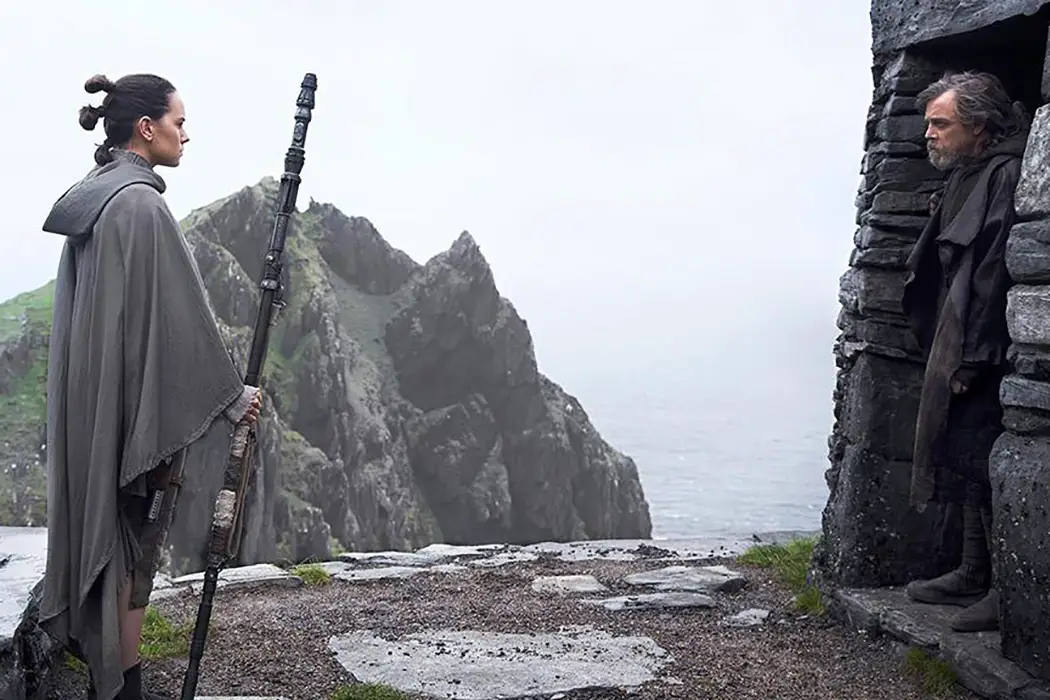
Hazem Fahmy is a poet and critic from Cairo. He…
I’m not interested in cowardly films; films that want to be radical but lack the gal to actually follow through. Who cares about a gay side character in Beauty and the Beast? Do you even remember his name? It was LeFou. I had to look it up because it was uninteresting; a lazy attempt at making a classic story more appealing to petty liberal sensibilities. Gender bend either Belle or the Beast, now that would have been interesting.
I loved Thor: Ragnarok with all its retro, pinball madness, but I felt let down by its childish refusal to dive into the rich thematic elements inherent in the story. At its heart, Thor’s third romp deals with the dread that comes with realizing that every perk and luxury you’ve ever been granted was the result of violent conquest. Also, your father was a brutal warlord. Hela is not just a super-powered Cate Blanchett in leather, she is an existential threat, one who seeks to reclaim the Asgardian narrative as much as Asgard itself.
Somewhere there’s a script of Ragnarok that anchors the story in that conflict. Maybe Taika Waititi didn’t have enough time to bring that script into fruition. Maybe the studio interfered. I don’t care. Ragnarok is a cowardly film.
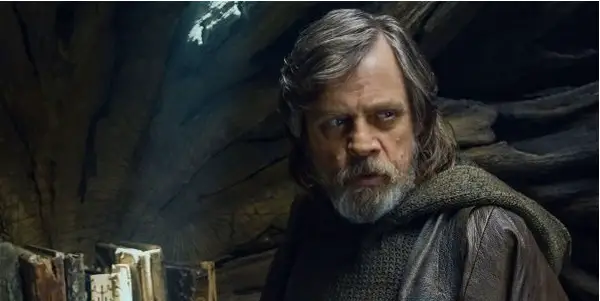
But The Last Jedi is not. If anything, the unprecedented polarization this film has received is a testament to the sheer boldness of Rian Johnson’s vision. I love the divisiveness it’s caused. I love how many emasculated fan boys are squealing because Luke wasn’t more of a badass – whatever that means.
Few films in 2017 made me as uncomfortable or anxious as The Last Jedi. Watching our heroes continuously fail in their desperate scramble to just barely survive was exhausting. But it was also one of the most breathtaking cinematic experiences of recent memory. I was literally on edge. I screamed. I laughed. I cried. I didn’t know what was going to happen or how. I just hoped for our heroes’ plan to work. And when it failed, I hoped again. And when the one after that failed, I hoped again. And again.
The greatest teacher, failure is
If Yoda didn’t make it clear enough, The Last Jedi is a film about failure. It is a reckoning for its characters, fans and very mythos. Everything that had been taken for granted since 1977 – the inherent morality of the Jedi Order, the efficacy of going in guns blazing every damn time, the assurance that anyone who was once ‘good’ can repent and return – is thrown into serious question. This isn’t a deranged Hayden Christensen screaming that “the Jedi are evil!” rather this is a sober and bitter look at all the failings of our heroes, as well as, more importantly, our heroes’ heroes.
Central to that theme of failure is an overt commentary on the failure of masculinity, specifically the failure to sustainably solve, and heal from, conflict. The riveting opening scene establishes this perfectly. Oscar Isaac’s dashing Poe Dameron undermines General Organa (Carrie Fisher’s last gift of a performance – one of her finest) and goes ahead with his all-out assault on the First Order fleet.
It’s a tremendous sequence: frantic, exciting and…devastating. In moments, the Resistance’s already minuscule fleet is decimated. Sure, Poe survives and completes his objective, the destruction of a colossal ship, but at what cost? The First Order can afford another Dreadnought. The Resistance can’t afford another small bomber.
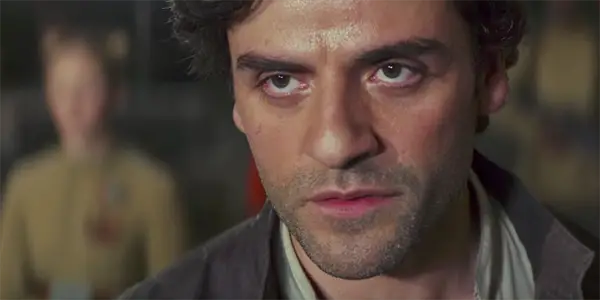
Perhaps in any other film, this kind of scene would be shrugged off. Poe would be hailed for his ballsy heroics, and Leia would just get over herself. But Johnson pushes against just that. While Poe flies around in his X-Wing, howling, we spend more time with Paige Tico in her last moments. We see her sweat, bleed and ultimately die for Poe’s plan. There’s a second of victory, punctured by dread: was it worth it? The time we spend with Paige, and Leia right afterwards, drowns the celebration. We are already weary, and soon we will grow suspicious.
In the second act, Johnson only doubles down on his indictment of Poe through his conflict with Laura Dern’s Vice Admiral Amilyn Holdo. From the moment she appears, Poe immediately, and severely, distrusts her. It is in this dynamic that Johnson displays his astute understanding of our toxic inclination to distrust women leaders, especially those who are overtly feminine. It is no coincidence that the Vice Admiral’s appearance sharply contrasts with Leia. Her hair is longer, untied and colorful. She wears a long, flowing dress. Most alarming for Poe, and by extension the audience, her plan hinges on a quiet retreat, rather than a full-frontal assault.
As we are socialized to value masculine qualities in leadership, many of us, too distrust Amilyn. Johnson counts on us siding with Poe, especially when he publically challenges and undermines her authority and capability. Our patriarchal notions of victory, as channeled through Poe, push us to believe that her strategy is timid and cowardly. So we are thrilled when Poe performs a mutiny, and spares none of the trust he previously displayed to Leia. Hence when Leia finally recovers, we expect that she, too will see Poe’s decision as heroic and necessary. Instead, she zaps his ass and deals him a profound lesson in warfare and survival.
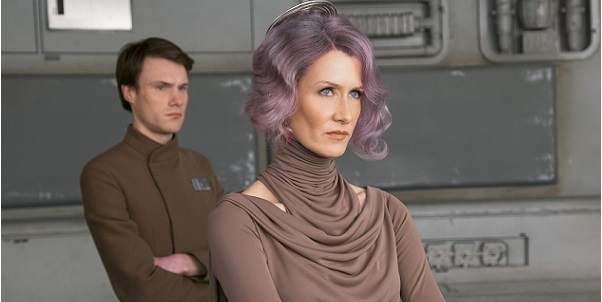
Poe’s position is even further discredited when Amilyn sacrifices herself during the evacuation to ensure the Resistance make it to safety. Unlike Poe’s own actions, hers is not done out of ego or showmanship, but rather the unfortunate conclusion that there was no other way to stall the impending destruction of the fleeing pods. In contrast to Poe’s earlier assault on the First Order, she deals even more damage while sparing lives instead of sacrificing any, save for her own.
We see a parallel dynamic reiterated through Finn and Rose’s journey. Finn’s arc begins with a moment of weakness when he decides to abandon ship. When Rose confronts him, he begins to steadily regain his confidence and sense of purpose. However, by the end this translates to another impulsive act of bravado when he attempts to sacrifice himself by flying into the First Order’s battering ram, only to be stopped by Rose.
In a confession that could’ve easily oozed of cheesiness (I certainly didn’t think it did), she states: “We’re going to win this war not by fighting what we hate, but saving what we love.” In addition to holding together the emotional and thematic essence of The Last Jedi, this line undercuts the ostensible nobility that accompanies these kinds of chivalrous, masculine acts. This is less of a tired rendition of “Love trumps hate” and more of a call for conflict to cease being such a zero-sum game.
Though less pronounced, this critique of masculinity is also strongly present in Rey’s arc, and in her relationships with both Luke and Kylo Ren. Her insistence on convincing Luke to come out of his hermit retirement forms a dialectic between their polarized viewpoints, between hope and despair, action and inaction – in a way, between a youthful, female-driven spirit, and the stagnant moroseness of a bitter old man.
Young and Restless
Luke’s failure here is a testament to the level of depth and nuance that has been applied to his character. His complete lack of motivation to step back into the fold, even if only through training, is multileveled, stemming from a depressing survey of the history of the Jedi as much as from his own role in creating Kylo Ren.
He has a point when he bashes the Jedi, what with all their hubris and the fact that the most devastating resurgence of the Sith in history occurred in their prime, right under their noses. Though implicitly, Luke too delivers a criticism of the Jedi’s masculinity. He speaks of their arrogance and lack of foresight, and he’s by no means wrong. The Jedi were a male-dominated order that valued stoicism over passion, suppression over expression. It’s no wonder they birthed one of the greatest Sith Lords of all time.
Luke is right to feel bitter, especially given his own guilt in perpetuating the cycle, but he fails when he stops there. Rey doesn’t just offer hope, she gives him a chance to rebuild with her a new vision of what the Jedi could be, and he simply tosses that aside, right into the water with an eye roll. He doesn’t even pay forward the treatment or training he himself got from Yoda not that long ago. Rey’s shock speaks volumes to many millennials’ disenchantment with the old political order. Instead of a willing hero, she finds a broken man who cannot fathom a new kind of resistance. Luke is right to forsake the old ways of the Jedi, but he is foolish to think their failure equates a total one.
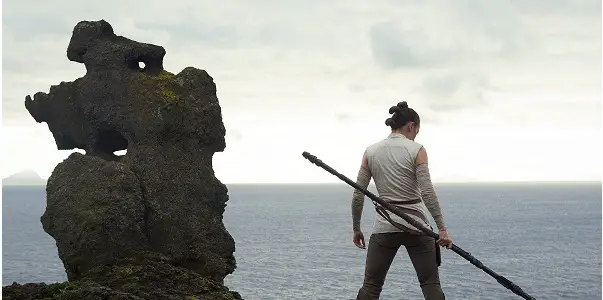
This focus on failure is what makes The Last Jedi so compelling as a character-driven story. Because more than just emphasizing the failures of its various characters, it pushes them to grow, giving everyone another chance and letting us judge how they choose to react the second time. Both Poe and Finn actively choose to follow and trust the wisdom of the women they’re with soon after they realize their mistake. Luke learns from Rey, and balances his rejection of the old ways with his newfound sense of purpose, choosing an evasive approach that saves rather than fights.
Without validating their failure, The Last Jedi offers a redemption for these men that is conditional on their own agency and growth. In this way, Johnson reminds us that it is not only the ‘bad’ men who are privy to the failures of masculinity. Every man, including our most cherished heroes, must fight through it.
In sharp contrast, Kylo Ren rejects Rey’s offer of acceptance and opts instead to indulge in the very toxicity that has marred the galaxy and his own life. In killing Snoke, he gave himself the opportunity to start anew, to heal from his past and atone for the suffering he had caused. He would not even be alone in such an endeavor, as Rey had made it clear that she had become emotionally and actively invested in the possibility of his recovery. But he throws all this away in pursuit of nothing but his own horrid interests.
In this way, Kylo represents the most toxic kind of masculinity: unceasingly violent, shrewdly manipulative, and beyond hope of redemption. Her inability to change him isn’t so much a failure on Rey’s part as it is a vital lesson in her growth as a new kind of Jedi, one who is far more at peace with her sense of compassion as she is with her sense of justice.
Conclusion: The Last Jedi & The Failure of Masculinity
Luke being the titular Last Jedi is no tragedy, for it’s a title that is as true as it is inaccurate. He is the last in a line that embodied the very failures of masculinity: the guns (or rather lightsaber) blazing approach, the fear of emotion, the denial of love. But in Rey, the galaxy, and the audience, receive a truly new hope, one with a much better shot at achieving a more lasting balance and peace. Here’s hoping she rids the galaxy of that Kylo bastard in Episode IX. More importantly, here’s hoping Poe and Finn listen, and follow along.
Could you relate to The Last Jedi commentary?
Does content like this matter to you?
Become a Member and support film journalism. Unlock access to all of Film Inquiry`s great articles. Join a community of like-minded readers who are passionate about cinema - get access to our private members Network, give back to independent filmmakers, and more.
Hazem Fahmy is a poet and critic from Cairo. He is an Honors graduate of Wesleyan University’s College of Letters where he studied literature, philosophy, history and film. His work has appeared, or is forthcoming in Apogee, HEArt, Mizna, and The Offing. In his spare time, Hazem writes about the Middle East and tries to come up with creative ways to mock Classicism. He makes videos occasionally.













